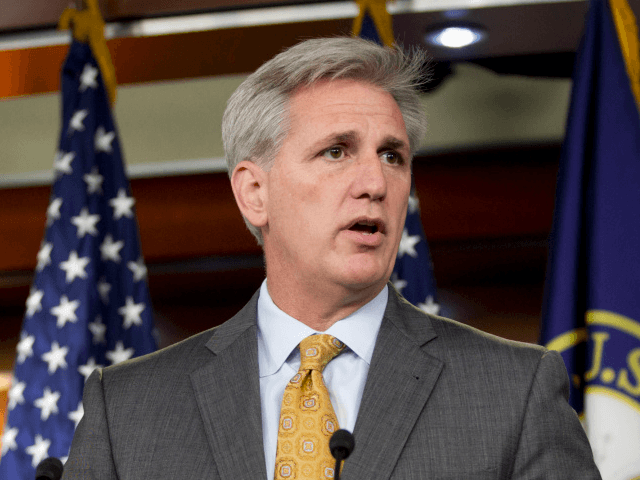The abrupt withdrawal of Rep. Kevin McCarthy from the race for House Speaker has sparked another existential crisis for Republicans in Washington.
While the specific reasons prompting McCarthy to drop out of a race he was expected to win are murky, the aftermath has brought another round of concern-trolling from the media and displayed, for all to see, a national political party that is hopelessly out of touch with its voters.
The chaos know embroiling the Republican caucus in the House stems from one key failing: D.C. Republicans refuse to allow a conservative into the ranks of House Leadership. Moreover, they refuse accept any reforms to the rules that allow them to dictate the legislative actions of the House.
What the public is witnessing is not so much a conference that can’t govern, but a large number of Republican lawmakers who refuse to accept any limits on their power to run the House or to dictate their issue priorities.
House Republicans won the majority by campaigning on a robust agenda of blocking and fighting the policies of the Obama Administration. Over three election cycles they promised to scrap ObamaCare, roll-back regulations, cut spending and block Obama’s executive orders granting amnesty to illegal immigrants.
Mind you, they were not forced into these positions, but spent hundreds of millions of dollars promising these things to voters across the country. They, if you will, volunteered to take up these fights. Only long after they had secured majorities in both the House and the Senate did Republicans in Washington inform their supporters that Obama’s veto pen blocked their promised actions.
Republican voters are not children and are well aware that Obama can, and probably would, veto any reforms measures that reached his desk. By forcing Obama to make these vetoes, however, the campaign of 2016 can be waged on clear political differences.
Standing for something is really the only promise Republican voters needed to be kept. The failure of Republicans in Washington is now reshaping politics across the nation.
Clear outsiders, who have never before held elective office, are dominating the Republican nomination campaign. Donald Trump has led national polls for more than three months now. The primary race isn’t solely a Trump phenomenon, though, as retired neurosurgeon has held the second slot equally as long. Carly Fiorina is rising in the polls while more establishment candidates like Jeb Bush and Marco Rubio are struggling. Rick Perry and Scott Walker, who both forgot their own histories and tried to appeal to the Republican establishment, are now historical footnotes.
In a number of polls, more than 60 percent of Republican voters want a candidate with no ties to Washington.
In the private sector, the woeful performance delivered by Washington Republicans would have led to a blood-letting of the corporate board room. The current situation within the Republican party is akin to a large group of activist shareholders, i.e. base voters, demanding a new corporate direction after disastrous market losses and brand mismanagement.
Republican party leadership likes to enmesh itself with the language of embracing the private sector and free enterprise. Their management, however, is more in keeping with a regulated utility immune from shareholder accountability.
Rather than learn from any possible mistakes, they lash out at conservatives, talk radio hosts, columnists, activists, and anyone else who took their promises seriously. One gets the feeling they would prefer everyone to be quiet and simply defer to their judgement. Exactly as many embattled CEO’s have lashed out at short-sellers, activist investors or the business press.
Once you start down that road, the gig is up.
Setting aside any unfounded rumors surrounding McCarthy’s exit from the Speaker’s race, perhaps we should simply take him at his word. He has explained that he dropped out of the race because he couldn’t get the support of every Republican in the conference.
Leading up the the vote to nominate McCarthy for Speaker, the House Freedom Caucus, a loose organization of 40-50 conservatives, announced it would vote to nominate Rep. Daniel Webster for Speaker. McCarthy would still have had enough support to win the Republican nomination for Speaker and been in a very strong position to win the formal vote on October 29th.
The House Freedom Caucus simply was withholding support for McCarthy at this time. It had not yet committed to block his vote on the floor, which would have thrown the Speaker’s race into a second or even multiple ballots. The group was seeking leverage to win support from McCarthy for a series of reforms of how the House is governed and, possibly, for a conservative member with the ranks of Leadership.
The only obstacle to McCarthy winning the support of the entire conference, then, was support of rules reform and backing a conservative for Leadership. Based on is own explanations, then, McCarthy dropped out because he couldn’t agree to those terms.
The scramble of Washington Republicans to find a new Speaker candidate is really a hunt for a nominee who could win support without those minor reforms and conditions. That is the real question now.
Republicans in Washington have lost the trust, and risk losing the support, of the voters who elected them. Their leadership, by the measures of the people who supported them, has been a failure. Rather than acknowledge that, they are still clinging to a fantasy of power.

COMMENTS
Please let us know if you're having issues with commenting.